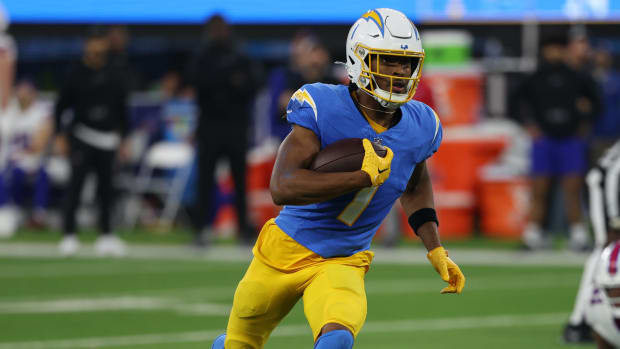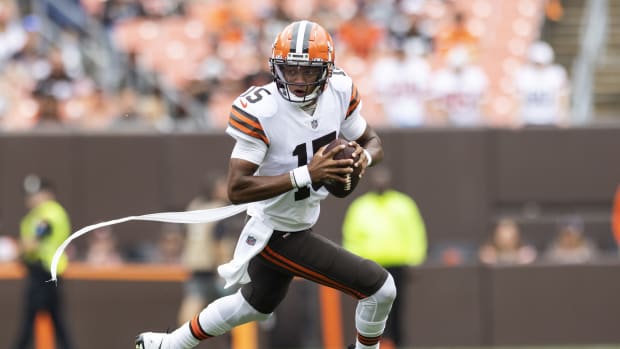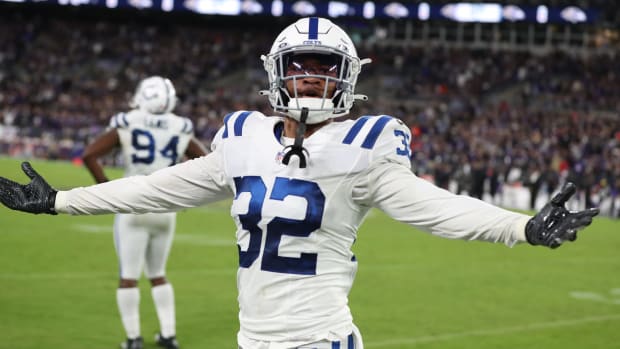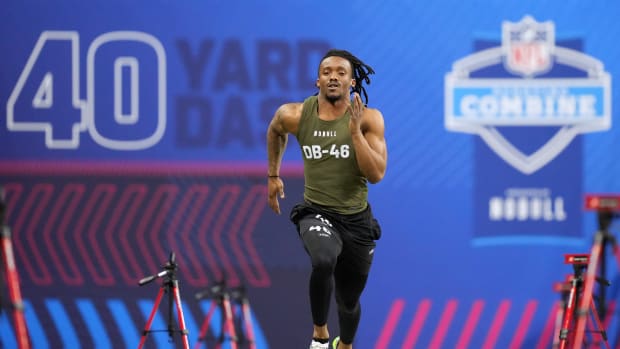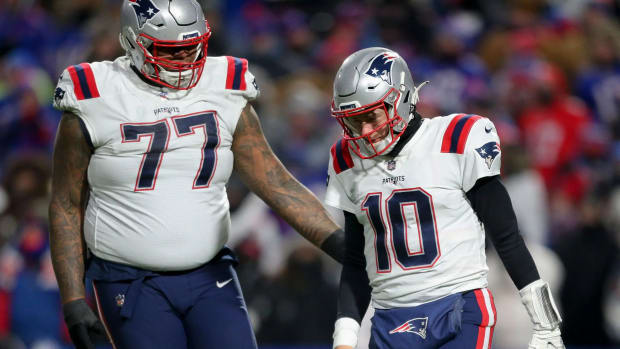Ranking 2024 NFL Coach Hires: Jim Harbaugh, Dan Quinn Top List
So, we’re going to rank the eight head coach hirings, and right away, I want to let you know that this is an unenviable task. Judging a head coach hiring on its face is almost impossible. We don’t know who these coaches will bring in, what kind of fire they have left, or what they will do when they lose four consecutive games and the owner starts texting his pals at Search Firm Incorporated.
We are judging them on their ability to lead and teach when a large handful of these coaches are meeting their pupils for the first time.
With that in mind, I’m going to purposely try to be a little long-winded in describing why I think a hire is “good” per sé vs. when a hire is not as good. Each of these teams are graded on an individual curve, and what I’m curious about is how we get to a place where a coach is going to improve an individual team. All of these coaches are good on the surface. But, are they good in the context of their job and what that job will look like immediately?
Let’s dive in.
1. Los Angeles Chargers: Jim Harbaugh
Here’s what I like about the Harbaugh hire: He is going to absolutely, positively, force the Chargers into contention and prevent the team from falling back into any of its prior inefficiencies. Think about the Chargers organization as a whole like someone who has been told by their doctor to enact a diet and exercise program for years without success. Harbaugh is the equivalent of that person, shipping them off to a vegan distance running camp with no way out. He is an all-or-nothing hire.
Los Angeles had reached that critical point by experimenting with the first two hires of the Justin Herbert era, and letting go of Shane Steichen, the one sensible piece that could have continued Herbert’s ascension. Harbaugh rectifies those errors by bringing in someone who has never not succeeded. He went from 7–4 to 11–1 at the University of San Diego. He went from 4–8 to 12–1 at Stanford. He won 13, 12 and 11 games during his first three years with the San Francisco 49ers and reached a Super Bowl. At Michigan, he went from 10–3 in 2015 to 15–0 and a national championship in ’23.
No hire can guarantee success, but if there is a coach on this list that I would bet has the most total success, it would be Harbaugh. Also, Harbaugh has already left what he described as his “dream” job at his alma mater, Michigan. He is now back in the NFL, where he has a reputation for being both difficult and brilliant. He’ll need to manage himself a second time around if he wants to have some staying power.
2. Washington Commanders: Dan Quinn

Quinn will be a star and help bridge the relationship between the Commanders and a war-torn fan base.
Robert Deutsch/USA TODAY Sports
Next to Harbaugh, Quinn was probably the safest hire. Also, it’s one that is heavily risk-averse on all sides. With the beginning of a new ownership structure for Washington, Quinn ensures that the team will not be embroiled in scandal or married in a deep malaise. Is he different enough from Ron Rivera to excite the fan base? Maybe not. But, in ousting previous owner Dan Snyder, the Commanders were able to get the kind of coach who never would have come here just a few years ago. While it’s my understanding that Quinn and Mike Macdonald were neck and neck at the end of Washington’s process, I think the Commanders provided themselves with less of a variance when it comes to success and failure.
So why isn’t he No. 1? Quinn has a deep knowledge of the division, and while his track record with offensive coordinators is spotty, he has the ability to lure a good one from time to time, like he did back in 2015 when the Falcons hired a young Kyle Shanahan to lead what would later become a Super Bowl–caliber offense. We don’t know enough about Quinn’s plan for the Commanders’ perpetually wayward offense, but we do know enough about Quinn himself to know that he may be able to negate it to some degree.
Quinn will be a star and help bridge the relationship between the Commanders and a war-torn fan base (not to mention a deep pool of excellent reporters who cover the team on a daily basis, who have not necessarily had much positivity to feast on).
A few notes from times I have spent with Quinn, or stories I have heard about him:
Right away, the facility will be transformed. In Atlanta, for example, Quinn had stationary footballs throughout the building in Flowery Branch, Ga., as an opportunity to teach ball security or the pursuit of the football for a defensive player. Whatever his mission will be in Washington, it will be reflected on the walls, and throughout the hallways.
Quinn is a natural teacher who loves to get off his chair and demonstrate (having once witnessed him tackle a communications associate to illustrate the nuances of an NFL rule, I can attest). He is also one to lend a sympathetic ear. There is a willingness to jump into a player’s personal life, contract situation, playing time gripe or whatever else that I have certainly not seen from other coaches.
While Rivera was not bad in any of these respects, the Quinn hire will be a healing one for Washington, even if one could able to argue that he was, at one point, third on their wish list behind Ben Johnson and Macdonald.
3. Brian Callahan, Tennessee Titans

Under Callahan, the Bengals offense didn’t completely fall off a cliff despite the loss of Joe Burrow.
Joseph Maiorana / USA TODAY Network
Callahan was a strong hire in a critical spot for the Titans, while Mike Vrabel sits out this carousel because, I’m told, he knows he has options. Next year’s cycle is already projected to offer some really intriguing opportunities. But in ousting someone such as Vrabel, the Titans did not have the luxury of swinging and missing. They were, according to some folks briefed on the matter, very aggressive in zeroing in on Callahan once they decided he was the guy. Had Callahan been allowed to fly to Atlanta for his second interview with the Falcons, who knows what would have happened.
Under Callahan, the Bengals offense didn’t completely fall off a cliff despite the loss of Joe Burrow. I think that was just as, if not more, important to Callahan’s candidacy than the success he had during the previous two years with Burrow.
Callahan’s offense, I’m guessing, will be as spacious and amoebic as it was under Burrow, which gives Will Levis, or whomever the Titans will target at quarterback, a lot of room to grow and experiment. I also think Callahan will fit well into the market with his laid-back demeanor.
His defensive coordinator, Dennard Wilson, is an early step in the right direction. Wilson, a former player who first went through the scouting pipeline before emerging as a coach on Jeff Fisher’s inaugural staff in St. Louis, held critical roles on the highly collaborative Eagles staff in 2022 and the Ravens staff in ’23. There is no doubt he is proficient in the Macdonald pressure library.
Why isn’t Callahan higher? Time will tell how he fits into a very new structure set up by Tennessee ownership. This highly collaborative approach has been successful in many other places, and mirrors more closely the intimate relationship the Bengals coaches had with their scouting staff. But we’ll now find out how strongly Callahan can communicate what kind of pieces he wants for this offense outside of the Bengals’ universe of highly skilled personnel folks.
4. Dave Canales, Carolina Panthers
The Panthers took a major swing on Canales, a 42-year-old who spent one year calling plays for the Tampa Bay Buccaneers. However, what I like about this hire is threefold:
- The Panthers get to keep Ejiro Evero, giving the team a crack at a top-10 defense and some continuity opposite Canales.
- The hire was made with Bryce Young specifically in mind. Having gotten to know both men at some point in my reporting career, they seem like kindred spirits. Canales also has a track record of maximizing the quarterback position based on an offense created via the quarterback’s unique comforts. The coach has been fearless throughout his career in spearheading systems for passers such as Young, including Russell Wilson (5’ 10”) and Baker Mayfield (6’ 0”).
- Canales was running a system in Tampa Bay that, I’m told, is actually more applicable to teams that don’t have a ton of elite receiving talent, which is what allowed the Buccaneers to maximize Mike Evans and Chris Godwin this past year. The idea, which basically asks all receivers to be able to challenge a defensive back four ways at the point of a cut in every concept, creates a built-in moment’s hesitation for the defensive backs. We should see more success out of the Panthers’ receiving unit early despite a relative lack of firepower.
5. Atlanta Falcons: Raheem Morris

Morris has deserved a chance to be a second-time head coach for more than a decade now.
Kirby Lee/USA TODAY Sports
Why is Morris so low? I think it has to do more with the Falcons’ decision-making processes than it does who they actually hired. Morris is great. I’m told he had a ton of support in the building, and one would assume owner Arthur Blank was hoping for someone who could reinvigorate the office vacated by Arthur Smith. I had suggested keeping Smith, and I don’t think I’m alone on that front, but it’s also no secret that Smith and Morris have very different personalities. Perhaps Blank felt like Morris’s affability, capacity to light up a room and unquestioned talents at the podium were good for business.
What makes less sense to me is cutting loose a defensive staff led by Ryan Nielsen. Could Morris theoretically make the Falcons’ defense better? Yes, but Atlanta was also the top team in the NFL in terms of expected points added via the rush defense. Atlanta’s pass defense was 10th in net yards per attempt surrendered. This was a good unit, and Nielsen was just coming into his own as a coordinator. Morris will truly have to shine on the offensive side of the ball, while maintaining a high defensive standard to make his presence felt.
We will also see if Atlanta decides to install a legitimate option at the quarterback position, at which point we’ll wonder whether Smith should have gotten a chance to prove himself in that regard first. (Sidenote: Morris has deserved a chance to be a second-time head coach for more than a decade now, so please don’t get my words twisted; I’m merely holding up the value of staff continuity and gradual improvement vs. ripping the Band-Aid off completely.)
6. Seattle Seahawks: Mike Macdonald

Macdonald’s defensive prowess is unquestioned, but it will certainly be challenged in the NFC West.
Charles LeClaire/USA TODAY Sports
This is the ranking I am prepared to be the most incorrect, and I’ll happily be proven wrong here (again, ranking things like this is difficult). I think Macdonald, the former Ravens defensive coordinator, could end up being the best hire of this cycle. That said, this is not without risk.
Below, with Jerod Mayo, we’re going to get into the idea of replacing someone such as Bill Belichick, and replacing Pete Carroll, is a complex and layered process. It’s going to take every bit of Macdonald’s interpersonal skills to be able to handle a transition like this. While every situation is different, I remember what it was like for Ben McAdoo to succeed Tom Coughlin in New York after the Giants coach had, over more than a decade, forged the team’s identity. That said, there is a reason Macdonald was the top-dog finalist among the remaining two teams to pick coaches.
Macdonald’s defensive prowess is unquestioned, but it will certainly be challenged on a regular basis in the NFC West. Macdonald coached well against the 49ers, Ravens, Dolphins and more during his stint as Ravens defensive coordinator. But … we don’t have a total sample size like some of the other more tenured coordinators on this list who are just now ascending to roles. Macdonald is facing a potential exodus of experienced defensive leaders, including one of the best linebackers in modern NFL history, Bobby Wagner. Leonard Williams and Jordyn Brooks are also scheduled to hit the open market. This is a roster in transition and will take a great deal of trust between coaching staff and front office after John Schiender’s team worked exclusively for one coach over the last decade-plus.
7. Jerod Mayo, New England Patriots

Whatever qualities Mayo displayed over his decades with the organization will have to be reproven as a standalone personality away from the gigantic shadow left behind by Belichick.
Bob DeChiara/USA TODAY Sports
I think asking a first-time head coach to replace Belichick—with that person also hiring very green offensive and defensive coordinators and a special teams coordinator with just two years in the league—is a red flag for me. Boston is a difficult market, and my concern for Mayo is what happens when Patriots fans start to develop the Belichick complex. What do I mean by this? I wouldn’t be surprised if, soon, we forget about the difficult end to Belichick’s tenure and start wondering whether Player A or Player B would have missed a tackle if we had a head coach more focused on the fundamentals (cue Boston talk radio accent voice). I know Mayo is smart and will leverage the differences between himself and Belichick effectively, but there are a few facts that remain inescapable right now:
• New England’s roster is one of the worst in the NFL.
• The Patriots don’t have a sensible solution at QB right now.
• The AFC East remains a very competitive division, and will be even more so with a healthy Aaron Rodgers.
Whatever qualities Mayo displayed over his decades with the organization will have to be reproven as a standalone personality away from the gigantic shadow left behind by Belichick. That’s a difficult task for anyone.
8. Antonio Pierce, Las Vegas Raiders

If a coach can steer a team out of darkness such as Pierce was able to do, he deserves credit.
Kirby Lee/USA TODAY Sports
I’m very conflicted when it comes to the interim coach hire. It’s so difficult to grade because, if a coach can steer a team out of darkness such as Pierce was able to do this season, he deserves credit. However, the track record for these coaches is dubious. And we can certainly argue that Dan Campbell was once an interim, and eight years later, he is regarded as one of the better head coaches in the NFL. But, we can also argue that there is a definite psychological bump that a team gets from ousting a stale personality such as Josh McDaniels and installing a former player with some serious juice such as Pierce. The issue is replicating that feeling on a consistent basis and ensuring that the interim candidate can hire an adequate offensive staff.
So, that’s why we’re looking at Pierce at No. 8. We don’t know where he’s headed offensively, but we do know where a lot of the better coordinator options have migrated already. We also know that Patrick Graham is coming back. (He was a finalist for the Seahawks job and has interviewed well across the NFL.) In my opinion, Graham is one of the more overlooked head coaching candidates because he happens to coach in more talent-deprived environments. That said, Graham’s presence should help Pierce.










































